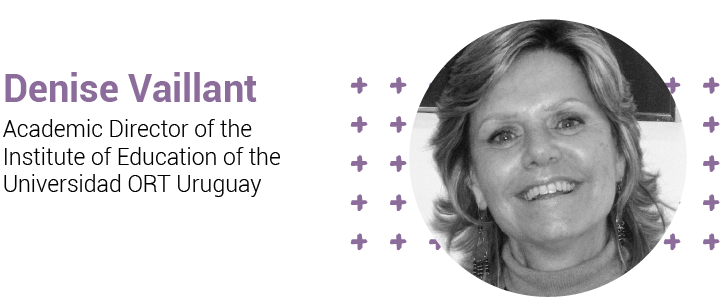
Member of the Board of Directors of the Fundación Ceibal.
In these pandemic times we lost everyday contact, eye contact and life in the school corridors, but we gained the opportunity to connect through technologies. The school doors were closed and we saw up close the inequalities, whether social, technological or economic, that in turn lead to many other inequalities. What has happened to learning during this time? Technologies have allowed learning to continue but at a very unequal level. Even in countries like Uruguay, where these is high connectivity in education thanks to the existence of the Plan Ceibal, students and teachers do not always use technologies as expected.
The new scenarios challenge us and perhaps allow us to see what kind of school we really want and what we have to change. The school we need is one that creates opportunities and offers possibilities for all children and young people. How can we advance? We have to place the emphasis on the potential of technologies for leaning with others, for collaborating and for generating open and flexible learning spaces.
Learning and teaching in hybrid in-person and online scenarios means making good decisions. What practices must always be in person? What practices can be done autonomously? What is it important to develop in person because it cannot be done the same way online? What activities can be done with distance learning? We must not lose the positive aspects of this emergency context we are going through. But we have to understand that the incorporation of technologies and of diverse platforms means much more than providing the centres with equipment and infrastructure. It means rethinking the curricular content, the role of teachers and students, and defining the organization of space and time itself.
The new educational scenarios should not be considered from a traditional model to which new things are added as they arise from technological advances; rather, it is necessary to rethink the model. We must have a teaching project that gives meaning, that legitimizes and allows us to decide when, how and why we use a given media or technology. It is not the resource, it is not the technology, it is not the platform that has teaching value by itself, but the uses that teachers and students come up with for them. The mere existence of a technological possibility is not enough for its educational use to become widespread.
Rethinking the meaning of education in the current context means bearing in mind the great social transformation of recent decades. If we are in a learning society, then we must go further and think about “learning to learn” and about “metacognition.” If we are moving from a stable or predictable society to an unpredictable one in transformation, then we must promote skills in students so that they can move in these changing environments.
The pandemic asks questions of us and must necessarily make us rethink the educational system and learning environments to address all the changes that we are going through and be able to thus navigate these rough seas of uncertainty.
